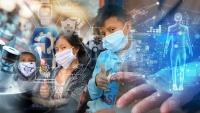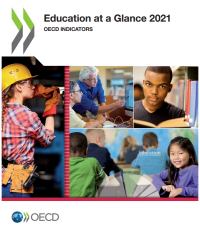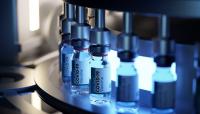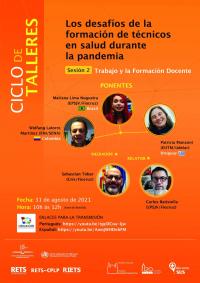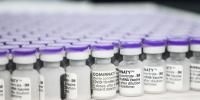You are here
News
-
10/05/2021 - The cocktail, recommended only for cases of high risk of hospitalization or death, combines the drugs casirivimab and imdevimab, but is patented. Given its high cost, a UN agency is negotiating to lower its price to make it more affordable.
-
09/30/2021 - Health leaders agree that a world without COVID-19 will not be possible until everyone has equal access to vaccines. More than 4.6 million people have died from the virus since it swept across the globe from the beginning of 2020, but it’s expected that the rate of people dying will slow if more people are vaccinated.
-
09/24/2021 - Resolutions adopted at the meeting address regional production of essential medicines and health technologies, reversing the decline in routine immunization, advancing digitalization of the health sector, strengthening health systems to better cope with emergencies, and other vital health matters.
-
09/17/2021 - The OECD (Organisation for Economic Co-operation and Development) launches the report "Education for a Glance 2021", in which it analyzes who participates in education, what is spent on it, how education systems work and the results obtained. 19.9% of youngsters between the ages of 18 and 24 fell into the NEET category in 2020 – a problem that was exacerbated by the coronavirus pandemic
-
09/09/2021 - The event, held on August 31 by EPSJV/Fiocruz, in cooperation with RETS and its sub-networks, had as discussants: Wolfang Alberto Latorre Martínez, from the National School of Instructors 'Rodolfo Martínez Tono', of the Servicio Nacional de Aprendizaje (ENI/SENA - Colombia); Mariana Lima Nogueira (EPSJV/Fiocruz - Brazil); and Patricia Manzoni, director of the University School of Medical Technology of the University of the Republic of Uruguay (EUTM/Udelar - Uruguay).
-
09/01/2021 - Millions of COVID patients still experience debilitating symptoms months after their infection. Many of them have to fight the additional battle of convincing their doctors or loved ones to take them seriously.
-
08/25/2021 - Pan American Health Organization (PAHO) Director Carissa F. Etienne said the severe shortage of COVID-19 vaccines in Latin America and the Caribbean is a “wake-up call” for increased regional production of vaccines and announced the start of a new platform to reach that goal. Director also reports that PAHO continues to distribute “much-needed medical supplies” in post-earthquake Haiti while the pandemic accelerates in many Central American and Caribbean countries.
-
08/20/2021 - Two studies now clarify why some people contracted coronavirus infection without experiencing problems while others fell ill to death. One of the studies points out that nearly 20% of deaths from covid-19 are due to the fact that patients produce a type of immune system protein that, far from protecting them against the virus, exacerbates its effects.Six percent of those over 80 years of age produce defective antibodies that worsen the disease.
-
08/19/2021 - The second session of the Cycle of Workshops 'The challenges of health technicians education during the pandemic', to be held on August 31st, from 10am to 12pm (Brasilia time), will address the theme of Work and Teacher Training. The idea is to present the theme and debate experiences, difficulties and strategies lived in the different institutions that make up the Networks. Wolfang Alberto Latorre Martínez, from the National School of Instructors 'Rodolfo Martínez Tono' (ENI/SENA - Colombia); Mariana Lima Nogueira, from EPSJV/Fiocruz - Brazil; and Patricia Manzoni, director of the University School of Medical Technology (EUTM/UDELAR - Uruguay) will participate as debaters in this workshop.
-
08/16/2021 - "Our region needs to pursue all possible avenues to expedite access and ensure countries reach their vaccination goals. We still need more donations; and we still need COVAX to deliver on its original commitment. We also need to create new opportunities that meet the diverse needs of our Member States, and that increase the supply of vaccines to the people and communities at greatest risk.” Carissa F. Etienne.



